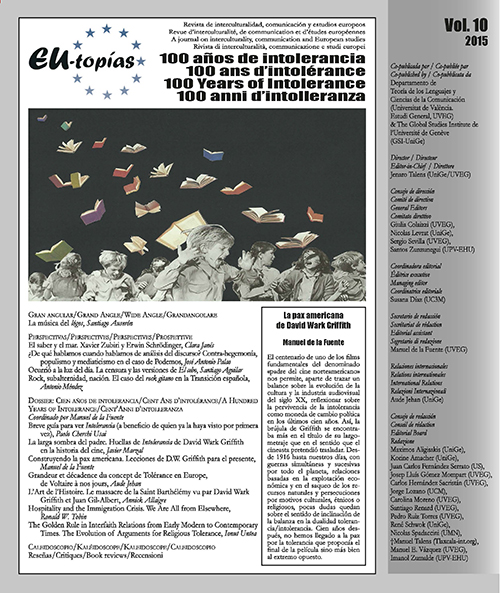The Music of Logos
DOI:
https://doi.org/10.7203/eutopias.0.18716Keywords:
Aristoxenus of Tarentum, Greek Peripatetic Philosophy, Sound Arts in Ancient Greece, Aristotle, Plato Abstract
Abstract
The aim of this paper is to reveal the logic of arts of sound in Ancient Greece and the impact they might have had on philosophical discourse. The study of both myths referring to the Art of the Muses and Homeric poems suggest that the oral tradition, with musical practices, gave rise to a transcendental idea of the subject and an experience in noise ratio, which conditioned the appearance of the logos. The widespread use of writing provoked thereafter, a translation from the sonorous records of memory to the visible signs, making explicit representational vocation of Greek thought which, under the hierarchical domination of letters left in the shade reciprocity of duties between body movement, music and speech.The Treaties of Aristoxenus of Tarentum prove this reciprocity and show that the rhythmic experience –neglected by philosophy for the harmonic model, from the Pythagoreans to Plato– built a primitive abstraction model. The paper aims to establish an interpretation of Greek metrics based on rhythm, which could be the preliminary step in the development of a theory of sound form.
 Downloads
Downloads
 References
References
Aristóteles (1991). Poética, ed. bilingüe Aníbal González, Madrid: Taurus.
— (1994), Acerca del alma, ed. Tomás Calvo Martínez, Madrid: Gredos.
— (1998), Metafísica, ed. trilingüe Valentín García Yebra, Madrid: Gredos.
— (2005), Política, ed. Julián Marías & María Araújo, Madrid: Centro de Estudios Políticos y Constitucionales.
Aristóxeno (2009), Harmónica. Rítmica, trad. Francisco Javier Pérez Cartagena, Madrid: Gredos.
Bergson, Henri (1985), Matière et mémoire. Essai sur la relation du corps à l’esprit, Paris: P.U.F.
— (1988), Essai sur les données immédiates de la conscience, Paris: P.U.F.
— (1992), Les deux sources de la morale et de la religion, Paris: P.U.F.
Bowra, Cecil Maurice (1962), Primitive Song, London: Weidenfeld & Nicolson.
— (2013), Homero, Madrid: Gredos.
Calame, Claude (2001), ‹‹Quelques formes chorales chez Aristophane: adresses aux dieux, mimésis dramatique et “performance” musicale››, Chanter les dieux. Musique et religion dans l’Antiquité grecque et romaine, Rennes: P.U.R.
Cornford, Francis M. (1987), Principium sapientiae. Los orígenes del pensamiento filosófico griego, Madrid: Visor.
Deleuze, Gilles (1985), Cinéma 2. L’image-temps, Paris: Minuit.
Deleuze, Gilles & Guattari, Félix (1980), Capitalisme et squizophrénie, II. Mille Plateaux, Paris: Minuit. Fränkel,
Hermann (1993), Poesía y filosofía de la Grecia arcaica, Madrid: Visor.
Gentili, Bruno (1996), Poesía y público en la Grecia antigua, Barcelona: Sirmio/Quaderns Crema.
Guattari, Félix (1979), L’inconscient machinique, Paris: Recherches.
Heidegger, Martin & Fink, Eugen (1986), Heráclito, ed. Jacobo Muñoz & Salvador Mas, Barcelona: Ariel.
Heráclito (2004-2005), Die Fragmente der Vorsocratiker, ed. Herman Diels & Walther Kranz, Berlin: Weidmannsche Buchhandlung.
Homero (1982), Odisea, trad. José Manuel Pabón, Madrid: Gredos.
— (1988), Himnos homéricos, ed. Alberto Bernabé Pajares, Madrid: Gredos.
— (1991), Ilíada, trad. Emilio Crespo Güemes, Madrid: Gredos.
Jakobson, Roman (1963-1973), Essais de linguistique générale, 1 y 2, Paris: Minuit.
Kirk, G. S. (1985), Los poemas de Homero, Buenos Aires: Paidós.
Marrou, Henri-Irénée (1964), Histoire de l’éducation dans l’Antiquité, Paris: Seuil.
Nietzsche, Friedrich (1973), El nacimiento de la tragedia, ed. Andrés Sánchez Pascual, Madrid: Alianza.
Parry, Milman (1987), The Making of Homeric Verse. The Collected Papers of Milman Parry, ed. Adam Parry, Oxford: Oxford University Press.
Platón (1990), Obras completas, ed. José Antonio Miguez, Madrid: Aguilar.
Schopenhauer, Arthur (2003), El mundo como voluntad y representación, ed. Roberto Rodríguez Aramayo, Madrid: Fondo de Cultura Económica/Círculo de Lectores.
Simondon, Gilbert (1995), L’individu et sa genèse physicobiologique, Paris: Jerôme Millon.
Svenbro, Jesper (1988), Phrasikleia: Anthropologie de la lecture en Grèce ancienne, Paris: La Découverte.
Vernant, Jean-Pierre (1996), Mythe et pensée chez les grecs. Études de psychologie historique, Paris: La Découverte.
West, M. L. (1982), Greek Metre, Oxford: Oxford University Press.
Whitman, Cedric H. (1965), Homer and the Heroic Tradition, New York: Norton.
Downloads
Published
How to Cite
-
Abstract277
-
PDF (Español)129
Issue
Section
License
The authors conserve the copyright. All content published in EU-topías. Journal of interculturality, Communication, and European Studies are subject to the license Creative Commons Attribution-NonCommercial-ShareAlike 4.0 license. The full text of the license can be found at <http://creativecommons.org/licenses/by-nc-sa/4.0>
They may be copied, used, disseminated, transmitted and publicly displayed, provided that:
- The authorship and original source of the publication is cited (journal, publisher and URL of the work).
- They are not used for commercial purposes.
- The existence and specifications of this license of use are mentioned.
It is the responsibility of the authors to obtain the necessary permissions for images that are subject to copyright.



